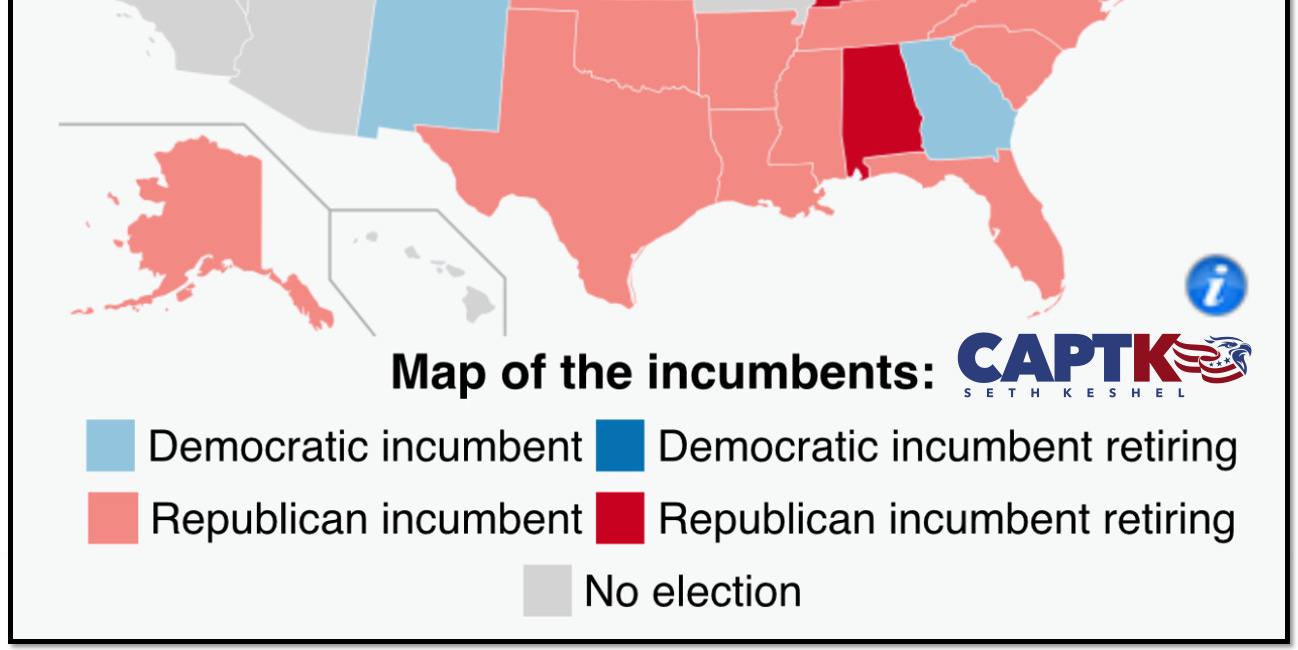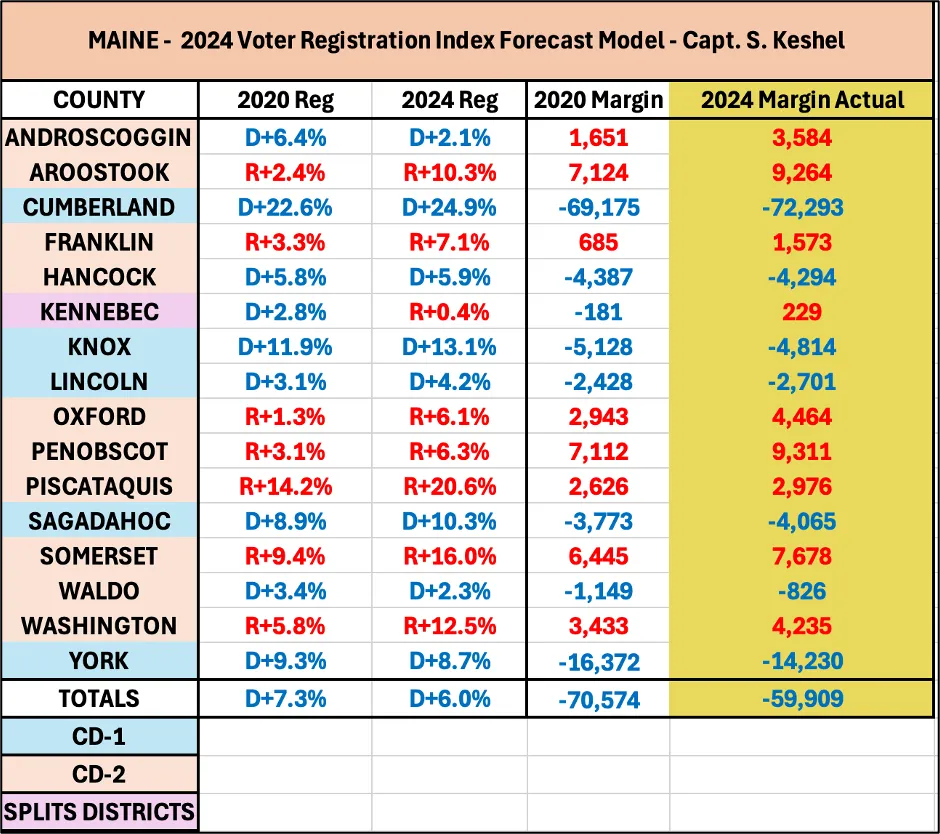Primarying Susan Collins is a Mistake
The ideology of pragmatism prevails in light of recent electoral facts.
In June, I previewed the 2026 races for U.S. Senate and determined it would take a year from hell to remove the Republican majority from the chamber; this differs from the race for the House majority, which is anyone’s guess at this moment with redistricting up in the air and the fierce headwinds historically sustained by the President’s party.
2026 U.S. Senate Overview (June 2025)
On most of my Substack live briefings, I receive questions about the Republican House and Senate majorities, and how likely it is for the GOP to hold or expand said majorities in either chamber in November 2026. I issued a brief primer of the 2026 midterms in February, and here, 17 months out, am going to give you the lay of the land for the U.S. Senate, which is much easier to predict and essential for ensuring no Democrat impeachment proceedings amount to a hill of beans if in fact they take the House, which history gives them a great shot at doing.
I determined the two most vulnerable Republican Senate seats are those in North Carolina and Maine. Thom Tillis, who failed to win either of his races by more than two points, has since announced he will not seek reelection in North Carolina, leaving a soon-to-be vacated seat up to GOP Primary voters first, and then the entire electorate in November. Susan Collins, who has won five races for her seat, is expected to run for a sixth term but has not yet formally announced her campaign.
Collins, along with Lisa Murkowski and Mitch McConnell, is one of the most unreliable Republican votes in the Senate. She voted against Pete Hegseth for Secretary of Defense and Kash Patel for FBI Director, but did manage to support controversial choices like Tulsi Gabbard (who has become a superstar) for DNI, and Robert F. Kennedy, Jr., for Secretary of Health and Human Services.
She has made other votes that are equally irritating, such as:
Refusal to vote for the repeal of the Affordable Care Act in 2017
Vote to convict Trump in impeachment trial, 2021
Refusal to support Amy Coney Barrett for Supreme Court
Support for Ketanji Brown Jackson for Supreme Court
Refusal to support the One Big Beautiful Bill Act
Support for pro-choice measures
On the other hand, she supported Trump’s tax reform bill in 2017, has backed numerous border security measures, and resisted the full court pressure campaign against American women to support Brett Kavanaugh’s nomination to the Supreme Court in 2018. She reportedly backed Trump’s position 94% of the time in 2017-18.
My conservative Republican view on Collins is that she is a weak Republican and I’d rather take my chances with gas station sushi on a long bus ride than I would have her as the deciding vote for a bill that would save America; the pragmatist in me sees the reality of the situation:
Collins is the only Republican in all of Congress from the six New England states
With three Trump elections in Maine in the books, it is clear Collins is the only candidate who can garner more ballots than a Democrat
Time for tough truth; I hate the lesser of two evils theorizing we must undertake in the political world. It may feel good to ball up fists and run off people who are unreliable, but I will guarantee you that any non-Collins nominee in Maine will lose that Senate seat. One other unexpected loss combined with Lisa Murkowski’s rumored move to Independent and Caucusing with Democrats status would have the chamber at 50-50.
Collins, based on her voting stance and socially liberal outlooks, is the only candidate who can run necessary margins in Maine’s 2nd Congressional District (won by Trump three times for a single electoral vote) and perform well enough in the lily-white extension of Boston known as Maine’s 1st Congressional District to have more ballots statewide than a Democrat. I encourage you to read my June 2024 assessment of Maine’s split electoral votes, which landed right on the money in November, to understand the differences in these districts:
Know Your 2024 Electoral College: Maine's Split Electors (2 of 4 Electoral Votes)
MAINE’S 1st CONGRESSIONAL DISTRICT
Maine also runs the dirtiest elections in New England, and it’s not even close:
Maine receives a Grade of 3 – Elevated Concern – based on its demerits and indication of concentrated manipulation in 2024. Maine and Vermont have the same laws with the exception that Vermont hasn’t implemented Ranked Choice Voting, which has given Democrats in Maine another lifeline for staying in power. Maine runs the worst elections in New England without peer. The only criteria preventing me from giving them a Grade of 4 is that I don’t see Trump as likely to have won the state, and the fact that Maine is only assigned 4 electoral votes.
Demerits: Voter ID, Same Day Registration, Excessive Mail-In Voting, Ballot Harvesting, Ranked Choice Voting, Automatic Voter Registration
Democrats have mastered ballot harvesting in Maine, and that (aided by Automatic Voter Registration) is the only reason they pried away the ME-2 House seat by an eyelash when Trump won the district by almost 10 points. Trump had 3,002 more votes than Hillary Clinton won the state with in 2016 in a losing effort in 2020, and 20,242 more than Clinton in 2024, yet lost the state by 6.9% to Kamala Harris.
In conclusion, it will take Collins’ ballot collection apparatus and non-threatening appeal to liberal whites to prevent a devastating loss of a key Senate seat in 2026. I don’t see her losing it, as she has won over and over again against tough opponents and in Democrat leaning years, like 2008, when her race ran 38 points right of Obama’s presidential win occurring on the same ticket.
I don’t like backing people who have split loyalties and unpredictable positions on key measures; however, I know in a two-party system exactly what the ceiling for a more Trump-like candidate is, and the pitfalls for such a nomination lie exclusively in the southern district (ME-1).
Agreeing on these two outcomes (win with Collins or give away the seat with anyone else) will allow Republicans to focus on winnable seats, like Georgia or New Hampshire, key defenses, and the more important effort to retain a House majority. The choice is indeed a binary one - Collins, who will vote your way some of the time, or a Democrat, who will vote your way absolutely never.
Seth Keshel, MBA, is a former Army Captain of Military Intelligence and Afghanistan veteran. His analytical method of election forecasting and analytics is known worldwide, and he has been commended by President Donald J. Trump for his work in the field.






I’m in Maine. You are spot on. Susan is the least bad Senator we could come up with. Anyone else will be a disaster.
Excellent explanation. Thank you.